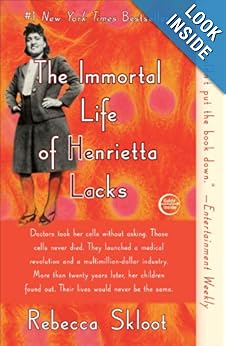Charlotte Mason said that all subjects should be "illustrated and illuminated by books of literary value."
 A few years ago I read such a book by science journalist Rebecca Skloot, The Immortal Life of Henrietta Lacks. It was fascinating, tragic and personal. As with any decent science book it made me think. I acquired a deeper knowledge of the history of genetic research and was swept into the realm of bioethics. When my son went to work in the lab at the Women's Research Hospital at Harvard I was able to have a surprisingly intelligent discussion with him about HeLa cells, their history and their place in science research today.
A few years ago I read such a book by science journalist Rebecca Skloot, The Immortal Life of Henrietta Lacks. It was fascinating, tragic and personal. As with any decent science book it made me think. I acquired a deeper knowledge of the history of genetic research and was swept into the realm of bioethics. When my son went to work in the lab at the Women's Research Hospital at Harvard I was able to have a surprisingly intelligent discussion with him about HeLa cells, their history and their place in science research today.Mason tells us that "we can only cover a mere inch of the field of science, it is true; but the attitude of mind we get in our own little bit of work helps us to the understanding of what is being done elsewhere." This one living science book gave me a deeper understanding on one subject but opened my mind to other closely related topics
This week, I read the news headline with great interest: The National Institute of Health Brokers HeLa Genome Deal. The book had made such an impression on me that I could still recall the people involved and empathized with their motivation and celebrate their accomplishment.
Ms. Skloot, the author of the book, was interviewed afresh with her perspective on this unprecedented agreement: August 9th CBC radio podcast . It was nice to hear her out loud voice as I felt I 'knew' her as I read her book.
A Mason education is a life. I read with my children for years and I continue to read for myself. A book like The Immortal Life Henrietta Lacks adds experience and knowledge to my life and I care to know more.
"The question is not how much does the youth know when he is finished with his education - but how much does he care? and about how any orders of things does he care?" Charlotte Mason
all quotes from: https://amblesideonline.org/CM/toc.html#6
How interesting. I worked with HeLa cells myself at uni, so I read Skloot's book with great interest. I'm off to read that headline now.
ReplyDeleteJeanne, what did you think of the news item?
ReplyDeleteWould you call that Biology I or Biology II if you had to classify it?
ReplyDeleteBiology II, if you are talking year 11 or 12. The book is very graphic and horrifying if a younger child were to read without context. Unless the family read it together.or unless there is great interest on the part of the student to read the bio ethic stuff in the news already and has some background.
ReplyDeleteThanks for this bloog post
ReplyDelete